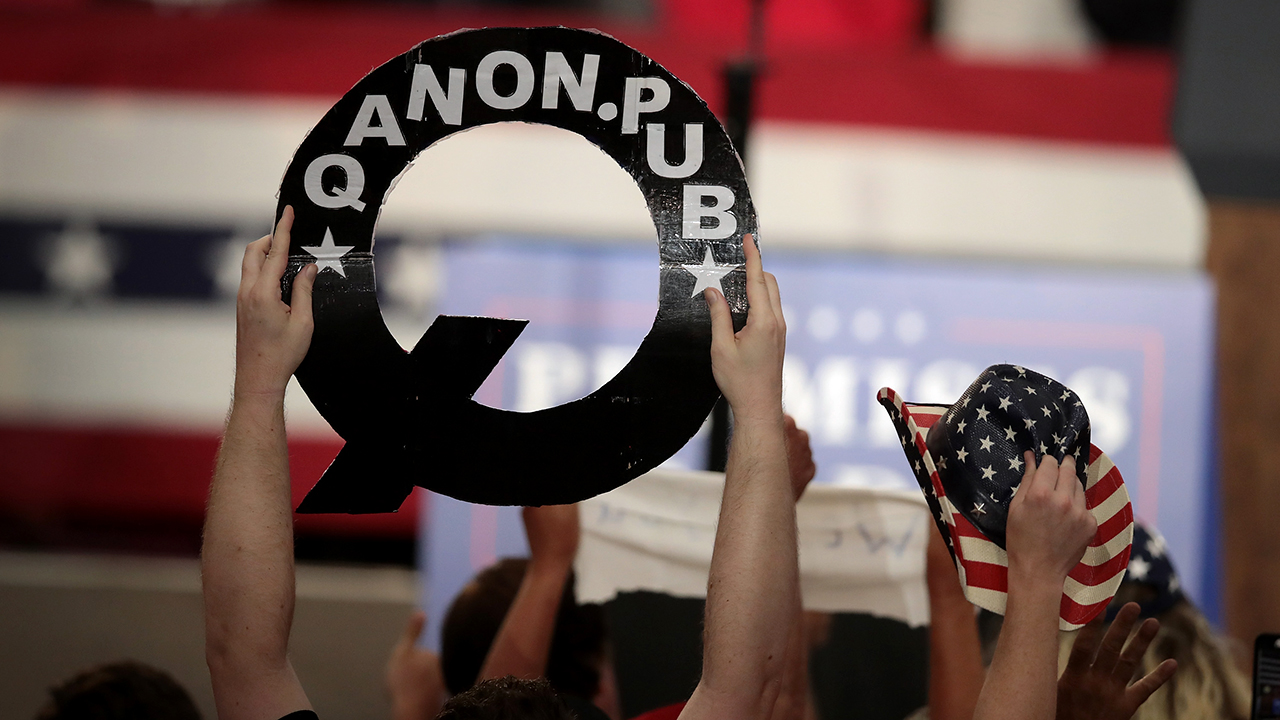
While much attention has been paid to online platforms that have become vehicles for misinformation and campaigns to sow division, the collection of connected conspiracy theories known as QAnon represents a different phenomenon. QAnon originated on internet chat boards, and its message has spread into the offline world, where its adherents surface at political and other rallies or are moved to actions that result in real-life incidents.
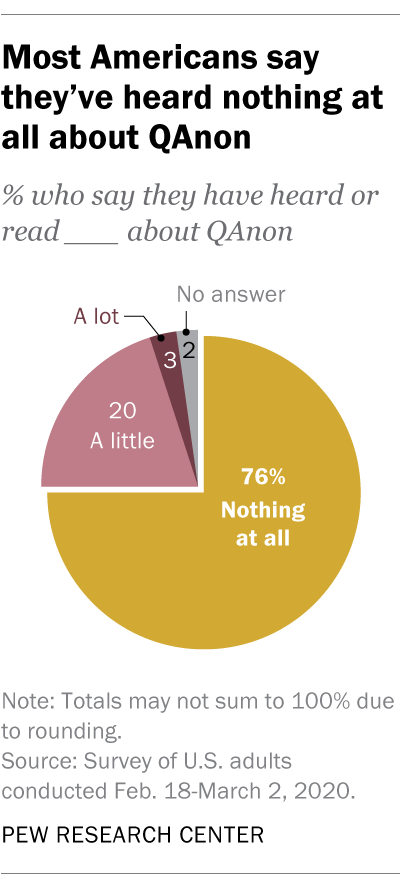
The conspiracy theories center around the idea of a “deep state” in which anti-American elements in the government, industry, media and other institutions are involved in activities including bringing down President Donald Trump. Also featured are allegations that prominent political figures and others participated in a global pedophile ring.
But despite QAnon’s spread, about three-quarters of U.S. adults (76%) say they have heard or read nothing at all about it, according to a Pew Research Center survey conducted in February and March. Around a quarter (23%) say they have heard or read a lot or a little, with 3% saying they’ve heard or read a lot. The data was gathered as part of the Center’s Election News Pathways project.
How we did this
To examine Americans’ familiarity with QAnon, we used data from a survey of 10,300 U.S. adults conducted in February and March 2020 as part of the Center’s nearly yearlong Election News Pathways project.
All survey participants are members of Pew Research Center’s American Trends Panel, a nationally representative online survey panel. Panelists were recruited by telephone or mail so that nearly every U.S. adult has a known chance of being selected. The data is weighted to further ensure it reflects the U.S. adult population by gender, race, ethnicity, partisan affiliation, education and other categories.
Here are the questions asked in this survey, along with responses, and its methodology. Visit our interactive data tool to access the data on QAnon and other issues related to news and the election.
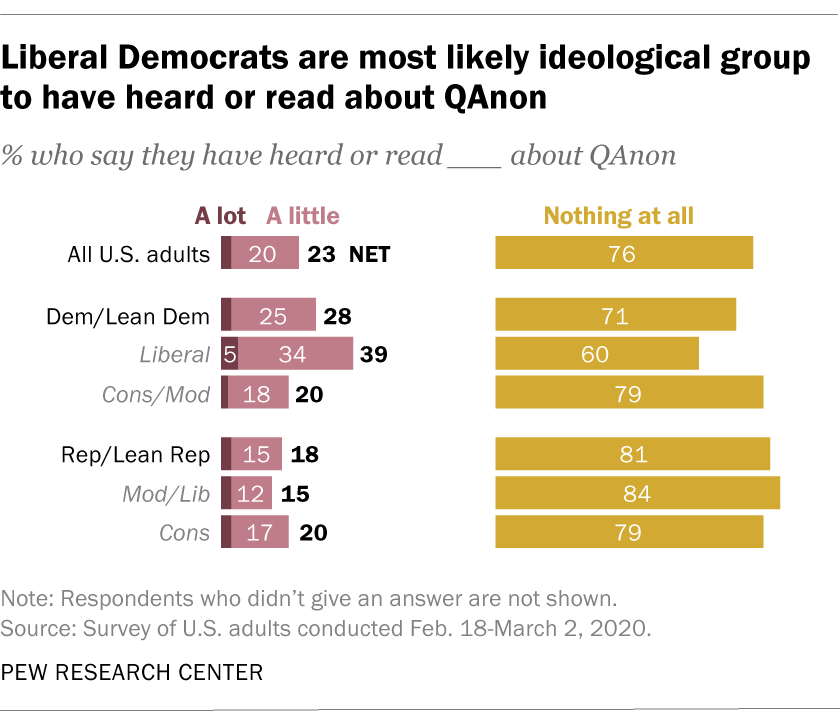
About three-in-ten Democrats and Democratic-leaning independents (28%) say they’ve heard or read a little or a lot about QAnon, compared with 18% of Republicans and those who lean toward the GOP. Overall, 3% of those in or leaning toward both parties say they have heard or read a lot about the conspiracy theories.
Although QAnon has gained a modest foothold among some far-right factions, liberal Democrats are the most likely of any ideological group to say they have heard or read something about it: 39% have heard or read at least a little, and 5% say they’ve heard or read a lot. In contrast, 20% of conservative and moderate Democrats have heard or read at least a little; 2% have heard or read a lot. Among Republicans, 20% of conservatives say they have heard or read at least a little about QAnon, compared with 15% of liberal and moderate Republicans. Identical shares (3%) of conservative Republicans and moderate and liberal Republicans have heard or read a lot about the conspiracy theories.
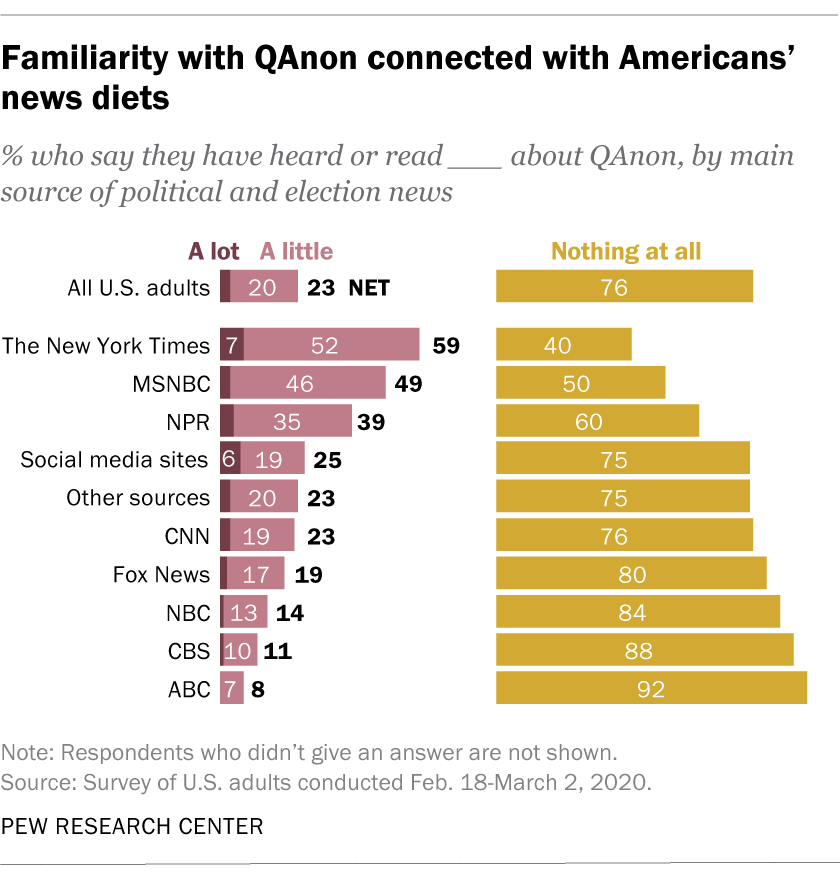
Familiarity with QAnon is also connected with the news Americans consume. Those who get their election and political news mainly from The New York Times (59%), MSNBC (49%) or NPR (39%) are most likely to say they’ve heard or read at least a little about QAnon. And 7% of New York Times readers say they’ve heard or read a lot – the highest share of any group. In contrast, roughly two-in-ten consumers whose main source of news is CNN (23%) or Fox News (19%) and around one-in-ten whose main news source is CBS (11%) or ABC (8%) say they have heard or read at least a little about the conspiracy theories.
Overall, 25% of adults who name a social media site as their main source of election news say they have heard or read at least a little about QAnon, according to the recent survey.
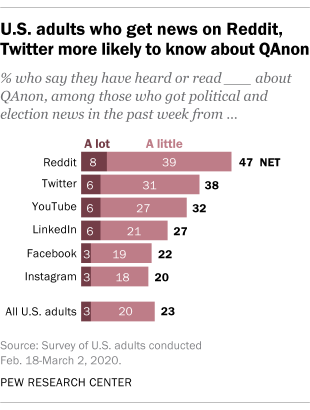
Knowledge of QAnon varies based on the social media platform used in the past week for election news. For example, people who got news from Reddit or Twitter are most likely to say they’ve heard or read a lot (8% and 6%, respectively) or a little (39% of Reddit users and 31% of Twitter users) about the conspiracy theories. Those who got news from YouTube are also more likely than Americans overall to have heard or read a lot (6%) or a little (27%) about QAnon.
Around four-in-ten adults (43%) who say they follow political and election news very closely say they have heard or read at least a little about QAnon, compared with 24% of those who follow the news somewhat closely.
There is also a gap among partisans who trust the national media. Democrats who trust the media are roughly twice as likely as Republicans who trust the media to say they’ve heard or read something about QAnon (29% vs. 13%). Among partisans who do not trust the media, about two-in-ten in each party say they have heard or read a little or a lot.
There are also differences in familiarity based on gender and age. Among men, 4% say they have heard or read a lot about it, compared with 1% of women. Adults younger than 30 are somewhat more likely to have heard or read a lot about it than those 65 and older (4% vs. 2%).
Correction (March 30): A previous version of this post mischaracterized the relationship between QAnon knowledge levels and social media platforms used for news. The text and the chart “U.S. adults who get news on Reddit, Twitter more likely to know about QAnon” have been updated.
Note: Here are the questions asked in this survey, along with responses, and its methodology.